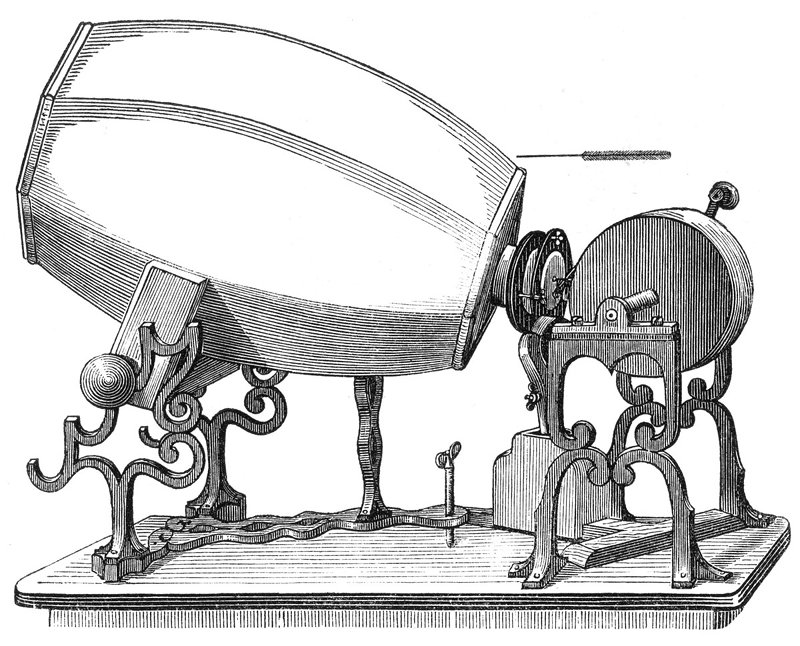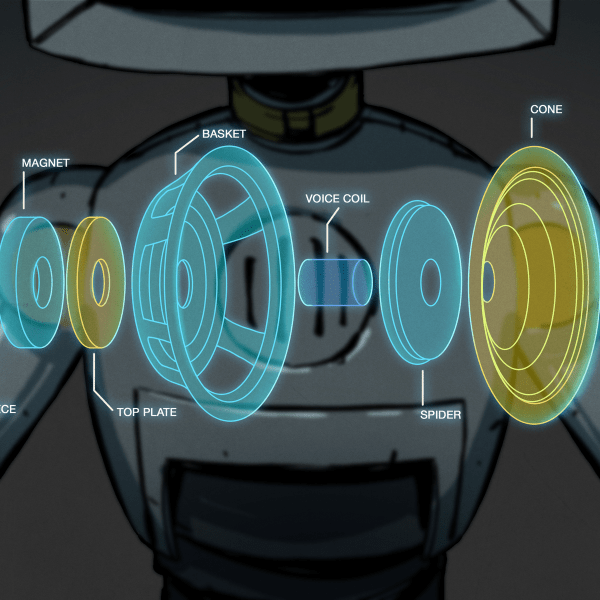You probably learned in school that Thomas Edison was the first human voice recorded, reciting Mary Had a Little Lamb. As it turns out though, that’s not strictly true. Edison might have been the first person to play his voice back, but he wasn’t the first to deliberately record. That honor goes to a French inventor named Édouard-Léon Scott de Martinville. He wanted to study sound and created the phonautograph — a device which visualized sound on soot-covered paper. They were not made to be played back, but the information is there. These recordings were made around 1860. There’s a 9-part video series about how the recordings were made — and more interestingly — how they were played back using modern technology. Part 1 appears below.
We say around 1860 because there were some early recordings starting around 1857 that haven’t been recovered. Eventually, the recordings would have a tuning fork sound which allows modern playback since the known signal can estimate the speed of the hand-cranked cylinder. The date of the first recovered recording was today, April 9th, 158 years ago.
The really interesting part is how they found some actual recordings with the original patent and then tracked down even more stored in archives. It is amazing that soot-covered paper has survived all these years. The website has a description of two different methods used to scan and playback the primitive recordings. You can also hear the recovered audio, of course.
We’ve heard rumblings — no pun intended — that audio might be accidentally recorded in pottery or other old artifacts. However, we haven’t seen any credible recovery of sound using these methods, including an attempt by MythBusters.
The phonautograph was a precursor to the phonograph, and we wonder if Edison was aware of it. It is interesting to think of the progression of audio recording media. Sooty paper, tinfoil, wax, vinyl, and even wire have held recordings. Of course, tape, plastic, and now whatever can hold digital data also do the job today.
















The paleophone fits in there somewhere.
Unintentional recordings are far older. Archaeoacoustics have tried to recover audio modulated grooves on pottery with varying success:
https://www.youtube.com/watch?v=Dzd4AVXBP9k
/possibly pseudo science/
Don’t believe everything on the internet. There is no “Loekasia Von Strabo” or even a University of Hilversum.
Ahahaha, I live near Hilversum (Netherlands), and the only thing close to a University is the Volksuniversiteit (“People’s university”). There you can learn to play Bridge, learn different kinds of cooking, learn how to appreciate art, learn a few languages, or follow an orientation-course in painting, and such. :)
What would be the best way to get this hoax video either removed or made to have a new caption that isn’t misleading? Is this protected speech? I suppose it’s no worse than some other conspiracy theories out there, but it does damage the integrity of the field and spreads falsehoods that already have begun to spread through the population.
That’s super interesting! But yeah, I’m skeptical as well. I guess it’s possible that a potter could accidentally transduce sound through his hands and into a pot while it was spinning on the wheel, but these materials are highly dampened and not shaped well to be sensitive to sound. And the normal trembling of muscles would introduce a terrible amount of noise, not to mention the eons of erosion and irregularities in the clay.
Still, it’s a very clever idea to see if sound data was inadvertently recorded in there. That kind of curious and creative approach should be applied to more concepts.
You would also only get very low frequencies and not the thousands of Hertz noise that video has.
Sounds like this pottery was made near a flock of blue whales and elephants.
I see you are a man who likes to comment first and read the article never.
The Petrachus Pot was found to be Belgian TV station’s April fools joke. https://www.economist.com/blogs/babbage/2011/07/ancient-audio
People really think that Edison was the first to record sound? That’s sad. I have always been told that “Thomas Edison was the first to create a practical method for recording and playing back sound”. If you don’t think de Martinville’s work is old news, then your grade school teachers let you down.
I’m no expert on the subject of Thomas Edison, but it’s my impression that he was the first to invent/do very little. He was the first to *commercialize* a lot of things. He was a capitalist, not a scientist.
He was the original Steve Jobs.
Probably removed the headphone jack from the phonograph ;)
Damn, I posted almost the same comment but not as good and much later than you did without realizing it. I’m a pod person! Nooo!
Aw thanks :) *e-high five*
This is an aside csb kinda thing but the first time I heard of Edison’s stable of geniuses and his taking credit for things was on a tour of his winter home. The tour guide was a grad student and as you can imagine had a bad taste in their mouth as far as profs forking grad students research lol.
My congratulations. Here is the key to the internet which you have easily won today.
Huh, well he was a bit like a 19th century version of Elon Musk. He did however take a lot of non-working ideas and perfect them. And the patent office might take issue with the notion that he didn’t invent a lot — they did issue him over a thousand patents.
And say you don’t have to invent something to get a Patent for it. You just have to beat the inventor to the patent office, or employ the inventor and have a legally binding IP contract or a crooked but talented lawyer :P
Eh, his reputation has been dragged through the mud in the past decade or so, largely due to unfair/stilted comparisons to Nikolai Tesla (perhaps fueled by a certain no-talent webcomic artist).
Maybe he didn’t invent ALL THE THINGS, but yes, he did invent SOME things, as well as perfecting/commoditizing/etc a lot.
IMO his legacy as an “inventor” is perhaps less significant, than that of being a pioneer of the early electric power distribution/grid era.
I don’t think he was known or pretended to be a scientist but more labeled as ‘inventor’.
Keep the insult on point.
I also had the notion that Edison invented precisely doodly squat, but he was a great businessman with a shrewd ability to find geniuses and steal their breakthroughs.
He was like a nineteenth century Steve Jobs.
Oh, that’s right, I totally forgot that you can’t make rational statements about Edison on this site because it brings out all the anti-Edison comments like a plague. It’s amazing how the age of the opinionated internet changes rational thought about history so much.
While true that Edison could be a ruthless businessman, he was also a genius before his time. But, it’s much easier to focus on the clouded view of him being the essential twin of satan rather than study actual facts to make a well-balanced perspective. Feel free to bash on with the Edison hate and while you’re at it, make sure you turn Nikoli Tesla into a god. (contrary to the assumption you just made, I am a big fan of Tesla as well as it is possible to appreciate both men for their strengths, weaknesses, and contributions to this world)
I guess you are the one who didn’t delve into the history of Edison.
Or are you one of Trumps’ sons?
Hey look at that, my point is proven. Thanks for your contribution of an uneducated assumption coupled with a personal insult that couldn’t be farther from the truth as an attempt at logical debate.
Scoured the site and couldn’t find a complete scan of any of the recordings. I thought it would be fun to try decoding them but all I see are a couple select fragments that decorate the published papers :/
I guess this might be something of note….. but it is like celebrating the first person to swim the English channel, even though they only made it a ways out, then got picked up by a boat for the rest of the way. You cannot verify a recording if you cannot play it back. How would you know if it really recorded the sound accurately without a mode of playback?
That’s like saying Charles Darwin had no business of looking at animals since he could only write their behaviour down, not play it back when back in England…
That argument makes no sense. Why would he be barred from looking at animals?
Evolution is not a technical invention. It’s a description of nature and a scientific theory.
A technical invention doesn’t exist unless it’s actually made. A picture of a sound wave isn’t audio. It becomes a recording of sound only if the sound can be played back.
Record: “to cause (sound, visual images, data, etc.) to be registered on something (such as a disc or magnetic tape) in reproducible form”
I believe that inventions evolve through influences, no man/woman is an island.
Yes, but the question is, who put two and two together to make four?
You can’t retroactively define someone as the inventor of something because we can -now- make it work.
Of course that doesn’t stop people from claiming that Leonardo DaVinci invented the helicopter.
A recording is a recording. HiFi came later. Edison made a replayable recording. Someone else made a recording on a disk. All inventions, all progress, probably they all built on the work of their predecessors to some extent.
We can easily scan waveforms and play them back these days. He could not, but it’s still verifiable as a recording nowadays.
I am amazed that nobody has yet posted this video: https://www.youtube.com/watch?v=kKBWsy5A2bA
Haha, I love that. Radio 4 newsreaders always sound so very serious, it’s adorable to hear her cracking up.
Just loved “The Night of the Listening Dead” after browsing through the pages of the original article!